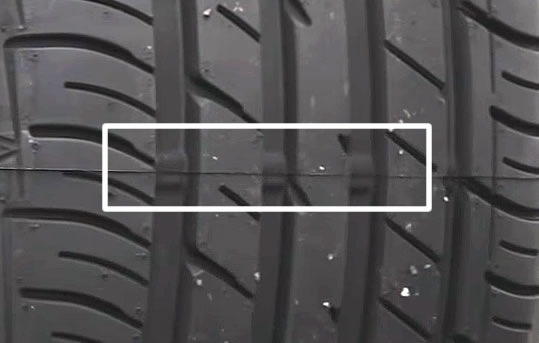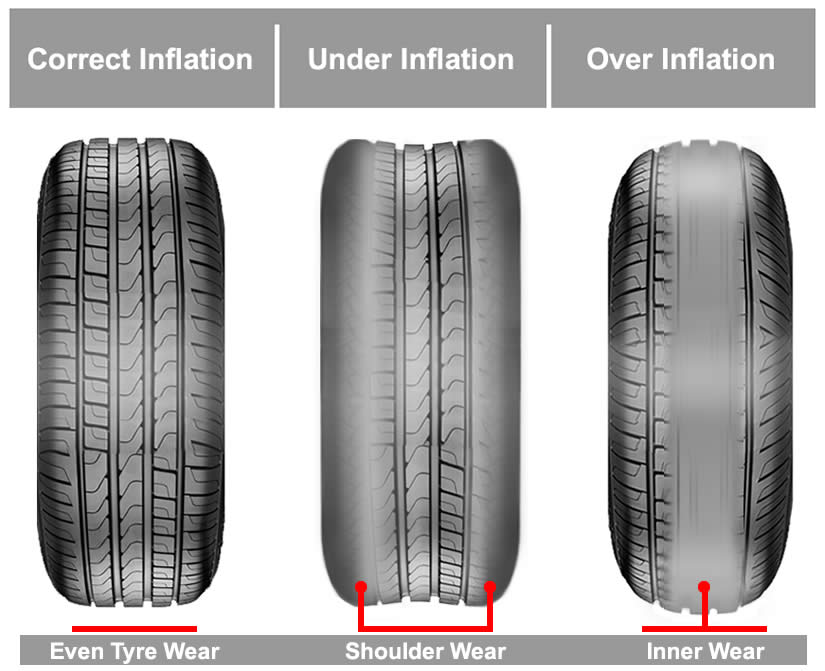Car Tyre Maintenance Tips
Your car’s tyres are important. Improperly maintained tyres can put you, your passengers and other road users at risk. Not are there only safety risks, there’s also the potential for penalty points and fines if tyres aren’t considered legal for public road use. The good news is that car tyres are easy to check and maintain, so let’s look at some car tyre maintenance tips.
Tyre Pressures
Correct tyre pressures are not only essential to your car’s stability, but also to the lifespan of your tyres. Your car tyres naturally lose air due to permeation through the rubber. This occurs at a rate of around 1 to 3 PSI per month depending on the rubber blend of your tyres.
Under-inflated tyres cause excess wear on the shoulders of the tyres and over-inflated tyres cause excess wear around the centre of the tyres. Improperly inflated tyres:
- reduces the stability and handling ability of your vehicle (particularly when it’s wet)
- increases the risk of tyre damage
- increases the risk of tyre blowout
- produces uneven tyre wear
- if under-inflated will increase fuel usage
Inflating tyres to the correct recommended pressures allows for even wear, maximum vehicle stability and will help to maintain the best fuel economy. You can find the recommended tyre pressures for your vehicle inside the driver’s door (on the centre pillar), inside the fuel filler cap or in your vehicle owners manual.
Tyre pressures should ideally be checked once each two weeks and each time before a long journey. Check tyre pressures when cold.
Wheel Alignment
Wheel alignment or ‘tracking’ is the angle in which your tyres are set. This angle can become offset due to hitting or mounting kerbs, driving through road potholes or anything else that can knock the tracking off. If you notice that you have uneven tyre wear on your front tyres, or that your steering pulls to one side, it’s likely you’ll need your wheels aligning.
Wheel Balancing
If you’ve ever noticed small weights attached to the side of a car’s wheel, those are placed there to balance the wheel. Uneven tyre wear causes the tyre to be heavier in certain areas and lighter in others. This in turn may result in uneven tyre wear, poor fuel economy and vibrating steering. You’ll normally have your wheels balanced when replacing your tyres, but if you notice any of the symptoms before they require changing, a good tyre maintenance tip is to have them balanced at any tyre workshop.
Driving Habits
How you drive has a direct impact on tyre wear. The harder you accelerate or brake causes greater wear on your tyres. Maintain a safe and steady driving style by anticipating the road ahead. When you a situation ahead that will require you to slow down (traffic lights, traffic queues, a corner in the road etc), ease off the accelerator to allow the car to naturally slow down rather than waiting till you get there to brake harshly.
Additionally, accelerate at a moderate speed, changing up gears quickly while keeping the engine speed low. This not only reduces the amount of fuel used, but helps to increase the lifespan of your tyres.
Keeping your Tyres Legal
Keeping your tyres legal is not only essential for safety, but particularly important if you want to avoid penalty points and fines.
Let’s start with the tread depth. For all four road tyres to be legal, there must be a minimum of 1.6 mm of tread depth. This applies to the centre three-quarters of the tyre tread and around the entire circumference. Large cuts in the tyre may also be illegal, particularly if you’re able to see the tyre cord. Any sizable cuts or bulges in your tyres will certainly fail an MOT.

Check on the inside and outside wall for any cuts and bulges. Many tyres come with minimum tread depth markers that can easily be distinguished as small squares of rubber between the trad grooves. You should replace tyres before the tread reaches the same level as the markers. Failing this, a tyre tread depth gauge can easily be purchased online at very affordable prices.
In the wet, tyres that are worn to the minimal legal limit (1.6 mm) are subject to an increased stopping distance of 44% compared to tyres that have 3 mm of tread depth or more. Drivers that are found with illegal tyres face fines of up to £2,500 and 3 penalty points per illegal tyre.
